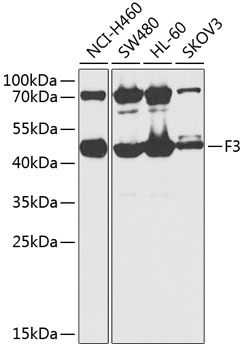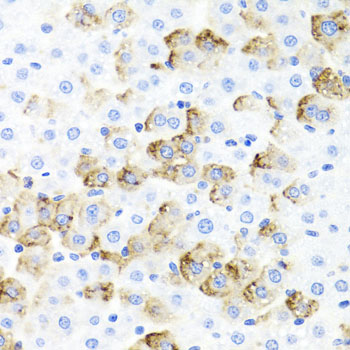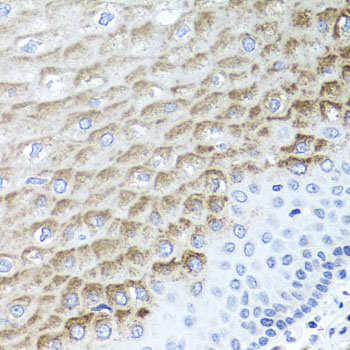Anti-F3 Antibody (CAB1378)
- SKU:
- CAB1378
- Product type:
- Antibody
- Reactivity:
- Human
- Reactivity:
- Rat
- Host Species:
- Rabbit
- Isotype:
- IgG
- Antibody Type:
- Polyclonal Antibody
- Research Area:
- Cardiovascular
Description
| 抗体名: | Anti-F3 Antibody |
| 抗体コード: | CAB1378 |
| 抗体サイズ: | 20uL, 50uL, 100uL |
| 申し込み: | WB IHC |
| 反応性: | Human, Rat |
| 宿主種: | Rabbit |
| 免疫原: | Recombinant fusion protein containing a sequence corresponding to amino acids 120-251 of human F3 (NP_001984.1). |
| 申し込み: | WB IHC |
| 推奨希釈: | WB 1:500 - 1:2000 IHC 1:50 - 1:200 |
| 反応性: | Human, Rat |
| ポジティブサンプル: | NCI-H460, SW480, HL-60, SKOV3 |
| 免疫原: | Recombinant fusion protein containing a sequence corresponding to amino acids 120-251 of human F3 (NP_001984.1). |
| 精製方法: | Affinity purification |
| ストレージバッファ: | Store at -20'C. Avoid freeze / thaw cycles. Buffer: PBS with 0.02% sodium azide, 50% glycerol, pH7.3. |
| アイソタイプ: | IgG |
| 順序: | SAGE PLYE NSPE FTPY LETN LGQP TIQS FEQV GTKV NVTV EDER TLVR RNNT FLSL RDVF GKDL IYTL YYWK SSSS GKKT AKTN TNEF LIDV DKGE NYCF SVQA VIPS RTVN RKST DSPV ECMG QEKG EFRE |
| 遺伝子ID: | 2152 |
| Uniprot: | P13726 |
| セルラーロケーション: | Membrane, Secreted, Single-pass type I membrane protein |
| 計算された分子量: | 27kDa/33kDa |
| 観察された分子量: | 45kDa |
| 同義語: | F3, CD142, TF, TFA |
| バックグラウンド: | This gene encodes coagulation factor III which is a cell surface glycoprotein. This factor enables cells to initiate the blood coagulation cascades, and it functions as the high-affinity receptor for the coagulation factor VII. The resulting complex provides a catalytic event that is responsible for initiation of the coagulation protease cascades by specific limited proteolysis. Unlike the other cofactors of these protease cascades, which circulate as nonfunctional precursors, this factor is a potent initiator that is fully functional when expressed on cell surfaces. There are 3 distinct domains of this factor: extracellular, transmembrane, and cytoplasmic. This protein is the only one in the coagulation pathway for which a congenital deficiency has not been described. Alternate splicing results in multiple transcript variants. |
| UniProt Protein Function: | F3: Initiates blood coagulation by forming a complex with circulating factor VII or VIIa. The [TF:VIIa] complex activates factors IX or X by specific limited protolysis. TF plays a role in normal hemostasis by initiating the cell-surface assembly and propagation of the coagulation protease cascade. Interacts with HSPE; the interaction, inhibited by heparin, promotes the generation of activated factor X and activates coagulation in the presence of activated factor VII. TF expression is highly dependent upon cell type. TF can also be induced by the inflammatory mediators interleukin 1 and TNF-alpha, as well as by endotoxin, to appear on monocytes and vascular endothelial cells as a component of cellular immune response. Lung, placenta and pancreas. Belongs to the tissue factor family. 2 isoforms of the human protein are produced by alternative splicing. |
| UniProt Protein Details: | Protein type:Membrane protein, integral; Cell surface Chromosomal Location of Human Ortholog: 1p22-p21 Cellular Component: cell surface; cytoplasm; extracellular matrix; extracellular space; integral to membrane; plasma membrane Molecular Function:hematopoietin/interferon-class (D200-domain) cytokine receptor activity; phospholipid binding; protease binding; protein binding Biological Process: activation of blood coagulation via clotting cascade; activation of plasma proteins during acute inflammatory response; aging; blood coagulation; blood coagulation, extrinsic pathway; caspase activation; cytokine and chemokine mediated signaling pathway; positive regulation of angiogenesis; positive regulation of cell migration; positive regulation of endothelial cell proliferation; positive regulation of positive chemotaxis; positive regulation of protein kinase B signaling cascade; positive regulation of smooth muscle cell migration; response to estradiol stimulus; response to lipopolysaccharide; response to low density lipoprotein stimulus; response to mechanical stimulus; response to temperature stimulus |
| NCBI Summary: | This gene encodes coagulation factor III which is a cell surface glycoprotein. This factor enables cells to initiate the blood coagulation cascades, and it functions as the high-affinity receptor for the coagulation factor VII. The resulting complex provides a catalytic event that is responsible for initiation of the coagulation protease cascades by specific limited proteolysis. Unlike the other cofactors of these protease cascades, which circulate as nonfunctional precursors, this factor is a potent initiator that is fully functional when expressed on cell surfaces. There are 3 distinct domains of this factor: extracellular, transmembrane, and cytoplasmic. This protein is the only one in the coagulation pathway for which a congenital deficiency has not been described. Alternate splicing results in multiple transcript variants.[provided by RefSeq, May 2010] |
| UniProt Code: | P13726 |
| NCBI GenInfo Identifier: | 135666 |
| NCBI Gene ID: | 2152 |
| NCBI Accession: | P13726.1 |
| UniProt Secondary Accession: | P13726,Q6FHG2, Q86WH4, D3DT47, |
| UniProt Related Accession: | P13726 |
| Molecular Weight: | 27,145 Da |
| NCBI Full Name: | Tissue factor |
| NCBI Synonym Full Names: | coagulation factor III, tissue factor |
| NCBI Official Symbol: | F3 |
| NCBI Official Synonym Symbols: | TF; TFA; CD142 |
| NCBI Protein Information: | tissue factor |
| UniProt Protein Name: | Tissue factor |
| UniProt Synonym Protein Names: | Coagulation factor III; Thromboplastin; CD_antigen: CD142 |
| Protein Family: | Tissue factor |
| UniProt Gene Name: | F3 |
| UniProt Entry Name: | TF_HUMAN |




